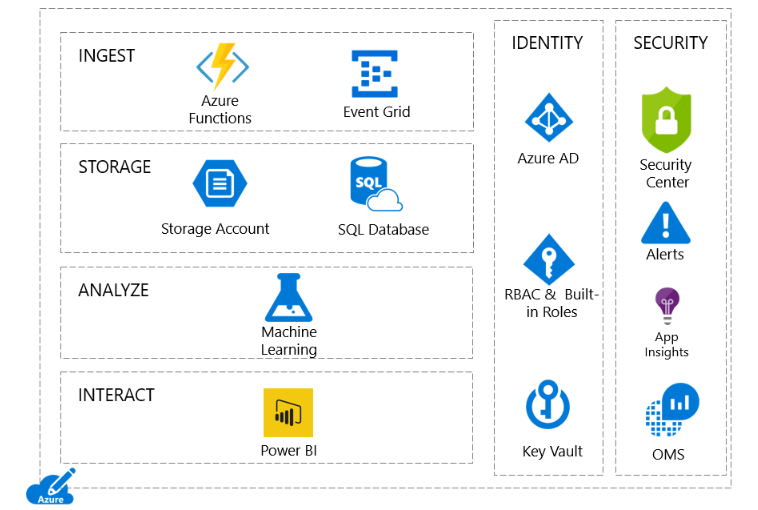Security Managed Services
When data of interest entails Protected Health
Information (PHI), Blood Analytics can implement security control measures to preserve the confidentiality and integrity of data during transmission, processing, and storage. We offer a full array of managed security services to suit your needs.
HIPPA Compliant data security | Email Security | Endpoint Protection |Portable Media Security|Mobile Device Security| Wireless Security | Configuration Management |Vulnerability Management|Network Protection|Transmission Protection|Password Management|Access Control|Audit, Logging, and Monitoring|Education, Training, & Awareness|Incident Management|Business Continuity & Disaster Recovery| Risk Management|Physical & Environmental Security|Data Protection & Privacy
Storage Security
Azure storage resources employ data obscuration and randomization techniques to safeguard data from brute-force ex-filtration and facilitate high data availability
Network Security
Microsoft Azure provides confidentiality, integrity, and availability of customer data, while also enabling transparent accountability.Azure supports dedicated WAN link connectivity to your on-premises network and an Azure Virtual Network with ExpressRoute. The link between Azure and your site uses a dedicated connection that does not go over the public Internet.
Advanced Threat Detection
Azure offers built in advanced threat detection functionality through services such as Azure Active Directory (Azure AD), Azure Operations Management Suite (OMS), and Azure Security Center. This collection of security services and capabilities provides a simple and fast way to understand what is happening on your gateway.
Our cloud based solution is powered by Microsoft Azure. Security is integrated into every aspect of the Azure. Azure offers you unique security advantages derived from global security intelligence, sophisticated customer-facing controls, and a secure hardened infrastructure. This powerful combination helps protect your applications and data, support your compliance efforts, and provide cost-effective security for organizations of all sizes.
HIPAA and the HITECH Act overview
The Health Insurance Portability and Accountability Act (HIPAA) is a US healthcare law that establishes requirements for the use, disclosure, and safeguarding of individually identifiable health information. It applies to covered entities—doctors’ offices, hospitals, health insurers, and other healthcare companies—with access to patients’ protected health information (PHI), as well as to business associates, such as cloud service and IT providers, that process PHI on their behalf. (Most covered entities do not carry out functions such as claims or data processing on their own; they rely on business associates to do so.)
The law regulates the use and dissemination of PHI in four general areas:
- Privacy, which covers patient confidentiality.
- Security, which deals with the protection of information, including physical, technological, and administrative safeguards.
- Identifiers, which are the types of information that cannot be released if collected for research purposes.
- Codes for electronic transmission of data in healthcare-related transactions, including eligibility and insurance claims and payments.
The scope of HIPAA was extended with the enactment of the Health Information Technology for Economic and Clinical Health (HITECH) Act. Together, HIPAA and HITECH Act rules include:
- The HIPAA Privacy Rule, which focuses on the right of individuals to control the use of their personal information, and covers the confidentiality of PHI, limiting its use and disclosure.
- The HIPAA Security Rule, which sets the standards for administrative, technical, and physical safeguards to protect electronic PHI from unauthorized access, use, and disclosure. It also includes such organizational requirements as Business Associate Agreements (BAAs).
The HITECH Breach Notification Final Rule, which requires giving notice to individuals and the government when a breach of unsecured PHI occurs






